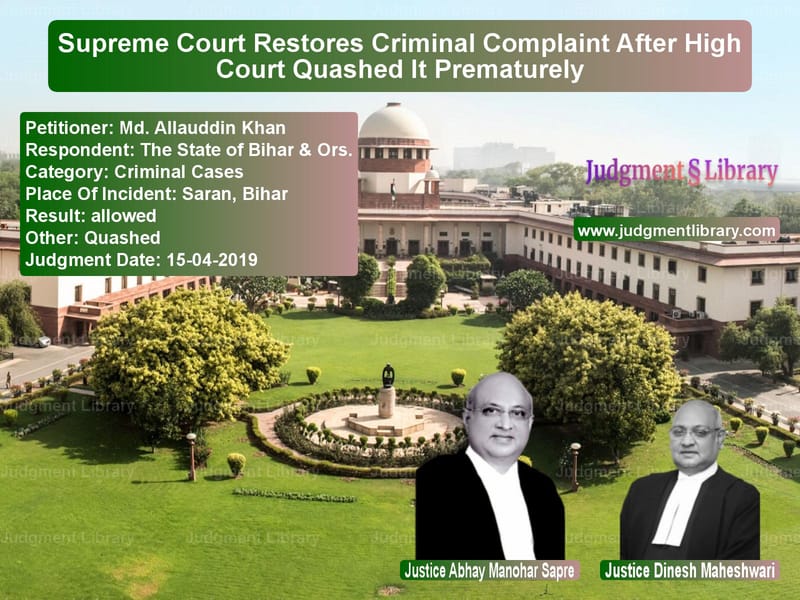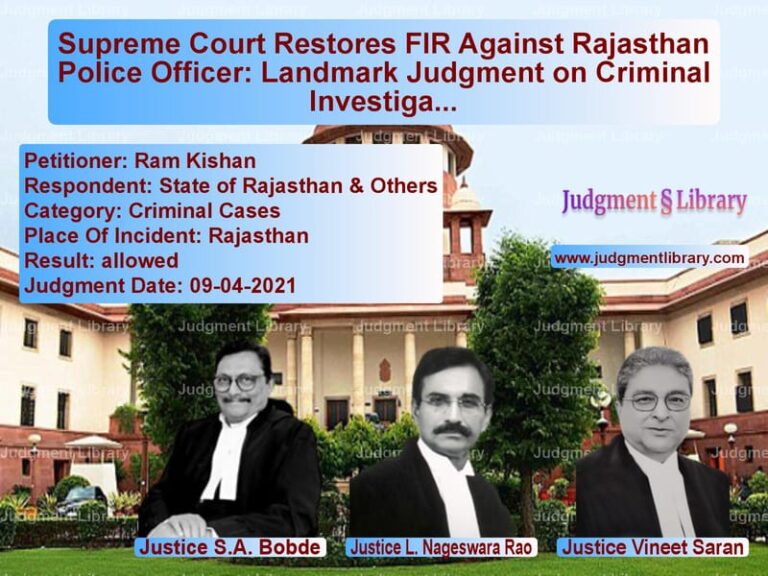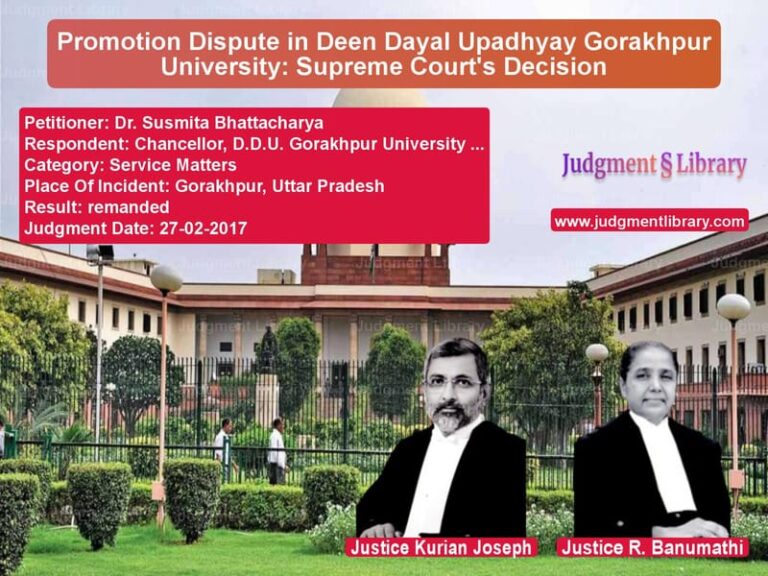Supreme Court Restores Criminal Complaint After High Court Quashed It Prematurely
The Supreme Court of India delivered a significant judgment in the case of Md. Allauddin Khan vs. The State of Bihar & Ors., ruling that the High Court erred in quashing a criminal complaint at a preliminary stage without a full trial. The Court emphasized that a criminal complaint cannot be dismissed merely because there is a parallel civil dispute, and contradictions in witness statements should be examined at the trial stage.
The ruling reaffirms the legal principle that High Courts should exercise their power under Section 482 of the Code of Criminal Procedure (CrPC) with caution and only in exceptional cases where continuing the trial would be a gross abuse of the judicial process.
Background of the Case
The dispute involved a shop located in Saran, Bihar, where the appellant, Md. Allauddin Khan, had been a tenant. The conflict arose when the respondents allegedly purchased the shop from the original owner and attempted to evict the appellant.
The sequence of events leading to the Supreme Court ruling is as follows:
- 2012: The appellant filed a complaint against the respondents, accusing them of offenses under Sections 323 (voluntarily causing hurt) and 379 (theft) read with Section 34 (common intention) of the Indian Penal Code (IPC).
- February 13, 2013: The Judicial Magistrate 1st Class, Saran, took cognizance of the case, ruling that there was sufficient material to proceed to trial.
- 2013: The respondents challenged the Magistrate’s order before the Patna High Court under Section 482 CrPC, seeking to quash the criminal complaint.
- September 11, 2017: The High Court allowed the challenge, ruling that the dispute was civil in nature and that the criminal case should not proceed.
- 2018: The appellant challenged the High Court’s order in the Supreme Court.
- April 15, 2019: The Supreme Court set aside the High Court’s order, restoring the complaint and directing the Judicial Magistrate to proceed with the trial.
Arguments by the Appellant (Md. Allauddin Khan)
The appellant contended that:
- The High Court quashed the criminal complaint without properly examining whether a prima facie case was made out.
- The existence of a parallel civil dispute over the tenancy did not preclude criminal prosecution.
- The complaint contained specific allegations that required examination through evidence.
- The contradictions in witness statements cited by the High Court could only be resolved during the trial.
Arguments by the Respondents (State of Bihar & Ors.)
The respondents argued:
- The dispute was primarily civil in nature, as it involved a property and tenancy issue.
- The criminal case was an attempt to pressure them in the civil dispute.
- The High Court rightly exercised its inherent powers to prevent abuse of process.
Supreme Court’s Observations and Ruling
The Supreme Court analyzed whether the High Court had correctly applied the principles governing the quashing of criminal complaints under Section 482 CrPC.
1. Criminal Case Cannot Be Quashed Merely Because of Civil Dispute
The Court observed:
“Mere pendency of a civil suit is not an answer to the question as to whether a case under Sections 323 and 379 read with Section 34 IPC is made out against the accused.”
This meant that even if there was a civil dispute over the property, the criminal allegations had to be examined separately.
2. High Court’s Findings Were Legally Unsustainable
The Court held:
“The High Court did not examine the case to determine whether the allegations made in the complaint prima facie made out the offenses under Sections 323, 379 read with Section 34 IPC.”
The ruling clarified that quashing a complaint required a thorough examination of its contents rather than a summary dismissal based on the existence of civil litigation.
3. Contradictions in Witness Statements Must Be Examined at Trial
The Supreme Court criticized the High Court’s reliance on contradictions in witness statements to quash the complaint:
“Whether there are contradictions in the statements of the witnesses is essentially an issue relating to the appreciation of evidence, which must be examined by the Judicial Magistrate during trial.”
This reaffirmed the principle that assessing witness credibility is the function of the trial court, not the High Court at a preliminary stage.
Final Ruling
The Supreme Court allowed the appeal:
- The High Court’s order quashing the complaint was set aside.
- The complaint was restored, and the order of the Judicial Magistrate taking cognizance was reinstated.
- The Judicial Magistrate was directed to proceed with the trial on merits, uninfluenced by the High Court’s earlier observations.
Implications of the Judgment
The ruling has important implications for criminal law and judicial procedure:
- Protection Against Premature Quashing: The judgment reinforces that criminal complaints should not be dismissed at the outset unless there is a clear abuse of process.
- Criminal and Civil Cases Are Distinct: Even if a dispute has civil elements, criminal offenses must be examined separately.
- Role of Trial Courts: The judgment clarifies that contradictions in witness statements and evidentiary issues should be addressed during the trial.
- Limited Scope of Section 482 CrPC: High Courts should exercise caution while using inherent powers to quash complaints, ensuring that genuine cases proceed to trial.
The Supreme Court’s ruling in Md. Allauddin Khan vs. The State of Bihar & Ors. underscores the importance of procedural fairness and prevents undue interference in criminal proceedings at a preliminary stage.
Petitioner Name: Md. Allauddin Khan.Respondent Name: The State of Bihar & Ors..Judgment By: Justice Abhay Manohar Sapre, Justice Dinesh Maheshwari.Place Of Incident: Saran, Bihar.Judgment Date: 15-04-2019.
Don’t miss out on the full details! Download the complete judgment in PDF format below and gain valuable insights instantly!
Download Judgment: Md. Allauddin Khan vs The State of Bihar & Supreme Court of India Judgment Dated 15-04-2019.pdf
Direct Downlaod Judgment: Direct downlaod this Judgment
See all petitions in Bail and Anticipatory Bail
See all petitions in Theft and Robbery Cases
See all petitions in Judgment by Abhay Manohar Sapre
See all petitions in Judgment by Dinesh Maheshwari
See all petitions in allowed
See all petitions in Quashed
See all petitions in supreme court of India judgments April 2019
See all petitions in 2019 judgments
See all posts in Criminal Cases Category
See all allowed petitions in Criminal Cases Category
See all Dismissed petitions in Criminal Cases Category
See all partially allowed petitions in Criminal Cases Category







